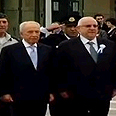
Israel's 19th Knesset sworn in; Peres: People want social reform
New Israeli parliament convenes for first time since elections for traditional swearing-in ceremony; president tells MKs 'You promised this would be most social Knesset'
The House is in session: The 19th Knesset convened for its inaugural session Tuesday, a traditional plenum session during which all Knesset members pledged their allegiance to the State and its laws.
The new Knesset has a record number of new legislators – 53 – and 48 of them have never held a parliamentary seat. The 19th Knesset now also holds the record for having the highest number of women and religious MKs – 27 and 38 respectively. Thirteen of the house members are Arab and Druze.
Related stories:
- Women excluded from coalition talks?
- Coalition talks: Lapid says 'not afraid' to be in opposition
Will Livni join government?
President Shimon Peres officially ushered in the new Knesset. "On its 64 anniversary, the Israeli Knesset won renewed trust and legitimacy," he said in his speech.
"The public's eyes are on you, members of Knesset, in the hope that you'll prove to be worthy emissaries for the creation of a better future."
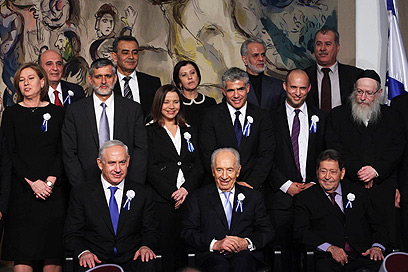
Group photo of party leaders with President Peres (Photo: Gil Yohanan)
Peres also referred to the large number of first-time parliament members and women members and said that "it's an achievement, but still a far cry from the proper balance."
The president added that "we are facing grave challenges which may prove to be existential threats or the gateway to new possibilities. We must examine ourselves and look to the outside, with a watchful eye. Israel is an island in a raging ocean; it must protect the lonely island, and act to calm the seas."
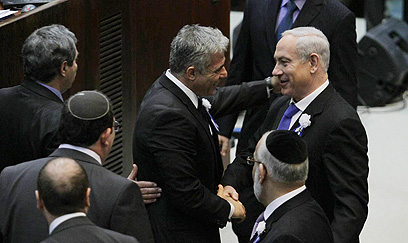
Partners in next coalition? Lapid (L) and Netanyahu (Photo: Gil Yochanan)
Addressing the economic and social issues, Peres said that he "calls on members of the house to undertake the effort to curb the deficit and achieve new growth. The great challenge standing before you, members of Knesset, is to answer the nation's expectation for social reform.
"You voiced a commitment, almost unanimously, that this Knesset will be the most social one we've known, that you will bridge the divide between the wealthy and the poor, for equal share of the burden," he said.
"We mustn't accept a reality in which 900,000 children are deprived of food and tens of thousands are deprived of education."
Peres, 89, Israel's elder statesman who serves a mostly ceremonial role as president, echoed concerns posed by a nuclear Iran but maintained that Israel has a friend in the White House who would protect it.
"President (Barack)Obama was wise enough to establish a wide coalition aided at preventing Iran from going nuclear. This coalition began with diplomatic pressure and economic sanctions and made it clear that it does not rule out other options on the table," he said before parliament. "The United States is the country able to put an end to the Iranian threat, and I believe the president of the United States is determined to do so."
Peres has picked Prime Minster Benjamin Netanyahu to form a new coalition government following the Jan. 22 election in which his Likud Party lost support but still remained the largest party in the 120-seat parliament. Negotiations to form a new government could take weeks.
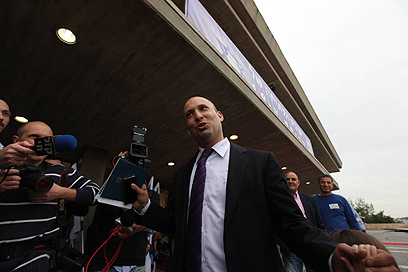
Naftali Bennett entering the Knesset (Photo: Gil Yohanan)
The new parliament is expected to focus more than the last one on domestic issues such as the economy, jobs and the country's social problems.
Netanyahu has said Iran tops his top international agenda. He has warned that the world has until this summer at the latest to keep Iran from building a nuclear bomb.
Iran recently announced plans to significantly increase its pace of uranium enrichment, which can make both reactor fuel and the fissile core of warheads. Iran insists its nuclear program is for peaceful purposes and says it does not seek to build an atomic bomb.
The US and its allies doubt the sincerity of that, but the Obama administration has sought to hold off Israeli military action, which experts say could trigger a region-wide war and result in the U.S. being pulled into another Mideast conflict.
In keeping with tradition, the eldest MK – in this case Binyamin Ben-Eliezer (Labor) headed the first plenum session, pending the future election of the Knesset speaker.
In his speech, Ben-Eliezer praised the outgoing government and said that "in its reign Israel managed to keep a steady economy despite the economic world crisis and global instability.
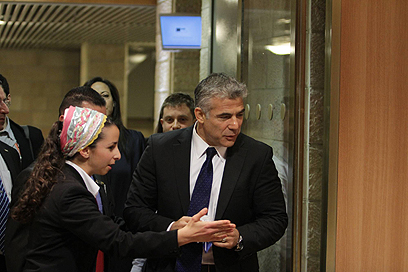
Yair Lapid arriving to the house (Photo: Gil Yohanan)
"This isn't an easy thing, but this achievement cannot make up for the last government's and previous governments' failures, including the deepening socio-economic gap and the unprecedented rise in poverty. The erosion in the middle classes is also grave," he said.
Also in keeping with tradition, the first thing the Knesset's 120 members heard in the inaugural session was the historic recording of Israel's first Prime Minister David Ben Gurion, declaring the inception of the State of Israel.
The MKs were later sworn in during a ceremony presided over by Chief Justice Asher Grunis, with President Peres and Prime Minister Benjamin Netanyahu serving as witnesses.
Following the swearing-in ceremony, the Knesset's 120 members convened at the Chagall State Hall, where PM Netanyahu urged them to "maintain this excitement and enthusiasm during each day you serve in the Israeli Knesset, and also maintain the sense of responsibility, because we have a great responsibility.
"We represent the country and serve the country. We serve the public, not the other way around, and we are obligated to improve the lives of the citizens, safeguard the Israeli economy and preserve the workplaces of Israel's citizens," he said.
The ceremony ended with the traditional group photo of the leaders of all the parties that crossed the electoral threshold.
AP contributed to the report
- Receive Ynetnews updates directly to your desktop










